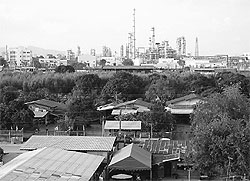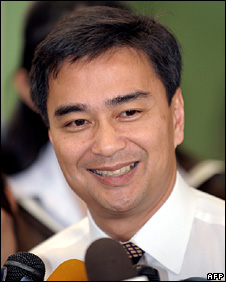Below is a guest post that appeared yesterday on the Bangkok Pundit blog, which is part of the Asian Correspondent site. Here is a link to the original post.
By Newley Purnell
With the dramatic political unrest that unfolded here in Bangkok during April and May, it may be easy to lose sight of a pressing business-related issue still facing Thailand: the ongoing Map Ta Phut industrial estate impasse.
Map Ta Phut, in Rayong province, is one of the world’s biggest industrial estates. It is home to projects by multinationals like Dow, as well as Thai firms like PTT and Siam Cement. But 76 projects in Map Ta Phut — worth an estimated US$10 billion — were suspended in a court ruling by Thailand’s Central Administrative Court in Sept., 2009.
The ruling came about after an environmental group and dozens of local residents filed suit, claiming people in the area have suffered adverse health effects due to ongoing pollution at the site.
Their lawsuit argued that the Map Ta Phut projects do not comply with the 2007 Thai constitution. This document has more strict environmental requirements than its predecessor, the 1997 constitution. But no regulations have been enacted since 2007 that would actually allow companies to comply with the new stipulations.
The Abhisit administration appealed, but a Dec. 2 Supreme Administrative Court ruling upheld the original decision, allowing just 11 of the projects to resume. The rest remain suspended. The government has set up a committee, which is says is comprised of various stakeholders, to find a way forward.
The suspension of the projects in Map Ta Phut has, understandably, caused concern among Thailand’s foreign investors. They say there’s a lack of clarity regarding the law, and indeed regarding future environmental enforcement in Thailand.
More details on the case can be found in previous Bangkok Pundit posts here and here. The New York Times ran a Dec. 18, 2009 piece that provides a good overview, and Al Jazeera ran a 22-minute documentary TV piece called “Toxic Thailand” on April 22. The BBC also ran a story on March 5.
More recently, in a June 29 piece, Reuters quoted the president of the Federation of Thai Industries as saying that the suspended projects should be able to begin again in late 2010 or early 2011.
But the latest developments will not be welcome news to investors.
The Bangkok Post ran a story Thursday detailing frustrations among the Japanese Chamber of Commerce (JCC) that the issue has continued to drag on. The president of JCC Bangkok, Junichi Mizonoue, was quoted as saying the Thai government has said it will need two more months to review a list of activities that would be considered harmful — a necessary step in ultimately reaching a resolution.
“Generally speaking,” he is quoted as saying in the Post story, “I don’t think Thailand can attract big new investments until all remaining issues related to Map Ta Phut become clear because all investors are so annoyed about the unclear regulations in Thailand.”
The JCC Isn’t the only party urging the Thai government to resolve the issue quickly. A separate Bangkok Post story from Thursday noted that the chairman of the Thai Chamber of Commerce says the government should try to bring the entire matter to a close within a month.
Earlier, on Jan. 14, Prime Minister Abhisit Vejjajiva said in an address at a Foreign Correspondents’ Club of Thailand event that it would take six to eight months to resolve the issue. That would mean, of course, by now — July to September, 2010.
The government might argue, of course, that the red shirt demonstrations over previous months has meant that the authorities had to focus their efforts on other issues — like maintaining law and order — and that a delay was inevitable.
On the other hand, investors and companies operating in Map Ta Phut might point not to the earlier time frame of six to eight months, or even the prospect of operations resuming at the end of 2010. They might highlight, in exasperation, this figure: 10 months. That’s the amount of time that has elapsed since the original court ruling. And there’s still no resolution.
And what about the people who live near Map Ta Phut? They have been voicing their complaints for years, they say.
Newley Purnell


